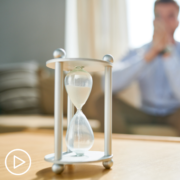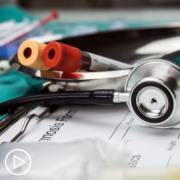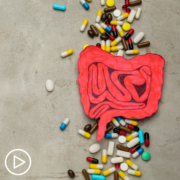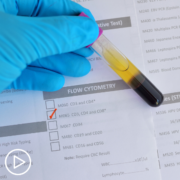Can CLL Treatment Cause Gastrointestinal Side Effects?
Can CLL Treatment Cause Gastrointestinal Side Effects? from Patient Empowerment Network on Vimeo.
What do chronic lymphocytic leukemia (CLL) patients need to know about gastrointestinal side effects? Expert Dr. Ryan Jacobs explains some common gastrointestinal side effects from treatment and how treatment can be adjusted to decrease severity of side effects.
Dr. Ryan Jacobs is a hematologist/oncologist specializing in Chronic Lymphocytic Leukemia from Levine Cancer Institute. Learn more about Dr. Jacobs.
Download Resource Guide | Descargar Guía en Español
Related Programs:

|

|

Are There Signs of Chronic Lymphocytic Leukemia Progression? |
Transcript:
Lisa Hatfield:
We have several questions from a couple of patients regarding a side effect. So the question, “How long will my side effects of my CLL treatment last? And what can be done to reduce those?” And specifically, a patient is asking if there’s a connection with CLL and gastrointestinal issues?
Dr. Ryan Jacobs:
So all of the treatments, including venetoclax (Venclexta), the BTK inhibitors, will have diarrhea listed as a possible side effect. It’s usually low grade. But generally, I have found the gastrointestinal toxicities abate some over time. So if they are present earlier, if you’re able to stick with therapy, they do tend to get better. For the once daily meds, I encourage those patients to try to take the drug in the evening. The GI tract tends to be less active later in the day, and you can sleep off some of the potential gastrointestinal issues. So I’ve had success there. Sometimes we have to lower the dose to just find the best dose to help mitigate some of these. There’s the antidiarrheals that can help if you need them. Imodium. I had a patient I saw earlier this week that Imodium didn’t really work, but good old Pepto Bismol did the trick from time to time.
So certainly though, if the gastrointestinal issues are significantly affecting quality of life, we need to come up with a new plan, whether that’s reducing the dose or changing to a different option. Specifically, what’s nice about the BTK inhibitors is they all have data that show if you’re having problems with one, you can switch to the other and likely not have the same problem occur. So that’s nice. Have you ever seen any uncharacteristic side effects several times in your practice? Anything really unique? I’m just curious about that.
Yeah. There’s always the patients, they can have a more severe form of maybe, of a more common side effect, like the…we were talking about diarrhea, I’ve had a patient that actually had a difficult time with venetoclax, had difficulties with the stool incontinence. So that was kind of a severe form of that. It wasn’t so much diarrhea that was the problem. But we were able to ultimately mitigate that with a dose reduction. I would say the way, particularly if it’s an unusual side effect, the best thing to do is to take a break. If it’s a serious side effect that needs to be addressed and it’s affecting quality of life or causing problems, take a break from the treatment. If you take a week off these treatments, particularly venetoclax, taking breaks doesn’t matter. We like not to take long breaks with the BTK inhibitors. But if you take a week off, these drugs don’t have very long half-lives. So if the issue is not getting any better and you’ve been off of treatment for a week, it’s unlikely that that issue is coming from the treatment. So that’s a way I try to sort through some…particularly if they’re unusual side effects sometimes. And certainly, if we deem that the issue is connected to the treatment, I’ll usually try lowering the dose before just giving up.










